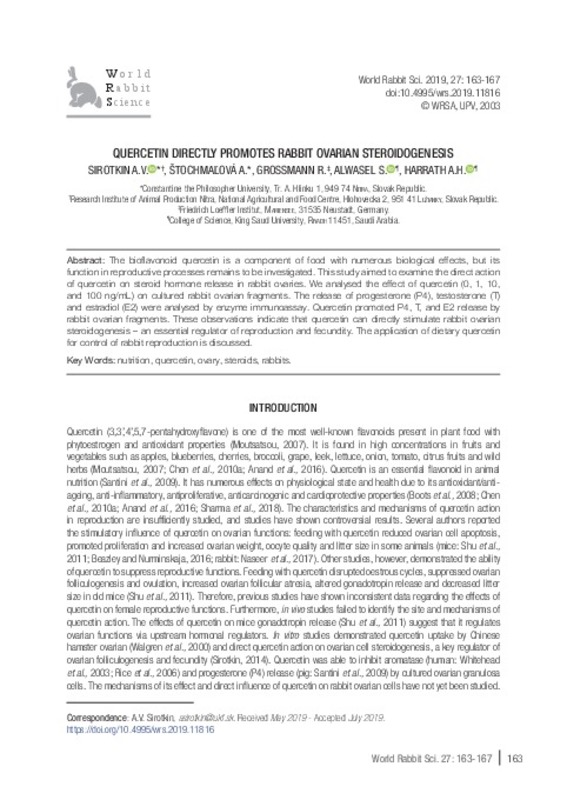Anand D.A.V., Arulmoli R., Parasuraman S. 2016. Overviews of biological importance of quercetin: a bioactive flavonoid. Pharmacogn. Rev., 10: 84-89. https://doi.org/10.4103/0973-7847.194044
Beazley K.E., Nurminskaya M. 2016. Effects of dietary quercetin on female fertility in mice: implication of transglutaminase 2. Reprod. Fertil. Dev., 28: 974-981. https://doi.org/10.1071/RD14155
Boots A.W., Haenen G.R.M.M., Bast A. 2008. Health effect of quercetin: from antioxidant to nutraceutical. Eur. J. Pharmacol., 585: 325-337. https://doi.org/10.1016/j.ejphar.2008.03.008
[+]
Anand D.A.V., Arulmoli R., Parasuraman S. 2016. Overviews of biological importance of quercetin: a bioactive flavonoid. Pharmacogn. Rev., 10: 84-89. https://doi.org/10.4103/0973-7847.194044
Beazley K.E., Nurminskaya M. 2016. Effects of dietary quercetin on female fertility in mice: implication of transglutaminase 2. Reprod. Fertil. Dev., 28: 974-981. https://doi.org/10.1071/RD14155
Boots A.W., Haenen G.R.M.M., Bast A. 2008. Health effect of quercetin: from antioxidant to nutraceutical. Eur. J. Pharmacol., 585: 325-337. https://doi.org/10.1016/j.ejphar.2008.03.008
Chen C., Zhou, J.J., 2010a. Quercetin: A potential drug to reverse multidrug resistance. Life Sci., 87: 333-338. https://doi.org/10.1016/j.lfs.2010.07.004
Chen Z.G., Luo L.L., Xu J.J., Zhuang X.L., Kong X.X., Fu Y.C., 2010b. Effects of plant polyphenols on ovarian follicular reserve in ageing rats. Biochem. Cell. Biol., 88: 737-45. https://doi.org/10.1139/O10-012
Münster E. 1989. Entwicklung von enzymimmunologischen Messverfahren auf Mikrotitrationsplatten zur Bestimmung von Testosteron und Progesteron im Blutplasma. Doctoral Thesis. Institut for Animal Production and Breeding of the University of Hohemheim. 154.
Naseer Z., Ahmad E., Epikmen E.T., Uçan U., Boyacioğlu M., İpek E., Akosy M. 2017. Quercetin supplemented diet improves follicular development, oocyte quality, and reduces ovarian apoptosis in rabbits during summer heat stress. Theriogenology, 96: 136-141. https://doi.org/10.1016/j.theriogenology.2017.03.029
Nna V.U., Usman U.Z., Ofutet E.O., Owu D.U. 2017. Quercetin exerts preventive, ameliorative and prophylactic effects on cadmium chloride - induced oxidative stress in the uterus and ovaries of female Wistar rats. Food Chem. Toxicol., 102: 143-155. https://doi.org/10.1016/j.fct.2017.02.010
Prakash B.S., Meyer H.H., Schallenberger E., van de Wiel D.F. 1987. Development of a sensitive enzyme immunoassay (EIA) for progesterone determination in unextracted bovine plasma using the second antibody
technique. J. Steroid Biochem. Mol. Biol., 28: 623-627. https://doi.org/10.1016/0022-4731(87)90389-X
Rice S., Mason H.D., Whitehead S.A. 2006. Phytoestrogens and their low dose combinations inhibit mRNA expression and activity of aromatase in human granulosa-luteal cells. J. Steroid Biochem. Mol. Biol., 101: 216-225. https://doi.org/10.1016/j.jsbmb.2006.06.021
Santini S.E., Basini G., Bussolati S., Grasselli F. 2009. The phytoestrogen quercetin impairs steroidogenesis and angiogenesis in swine granulosa cells in vitro. J. Biomed. Biotechnol., 2009: 419891. https://doi.org/10.1155/2009/419891
Sharma A., Kashyap D., Sak K., Tuli H.S., Sharma A.K. 2018. Therapeutic charm of quercetin and its derivatives: a review of research and patents. Pharm. Pat. Anal., 7: 15-32. https://doi.org/10.4155/ppa-2017-0030
Shu X., Hu X.J., Zhou S.Y., Xu C.L., Qiu Q.Q., Nie S.P., Xie M.Y. 2011. [Effect of quercetin exposure during the prepubertal period on ovarian development and reproductive endocrinology of mice]. Yao Xue Xue Bao, 46: 1051-1057.
Sirotkin A.V. 2014. Regulators of ovarian functions. New York: Nova Science Publishers Inc. 194, ISBN 978-1-62948-574-4.
Sirotkin A.V., Harrath A.H. 2014. Phytoestrogens and their effects. Eur J Pharmacol., 741: 230-236. https://doi.org/10.1016/j. ejphar.2014.07.057
Sirotkin A.V., Chrenek P., Kolesarová A., Parillo F., Zerani M., Boiti C. 2014. Novel regulators of rabbit reproductive functions. Anim. Reprod. Sci., 148: 188-196. https://doi.org/10.1016/j.anireprosci.2014.06.001
Sirotkin A.V., Kadasi A., Stochmalova A., Balazi A., Földesiová M., Makovicky P., Chrenek P., Harrath A.H. 2017. Effect of turmeric on the viability, ovarian folliculogenesis, fecundity, ovarian hormones and response to luteinizing hormone of rabbits. Animal. 26: 1-8. https://doi.org/10.1017/S175173111700235X
van Duursen M.B.M. 2017. Modulation of estrogen synthesis and metabolism by phytoestrogens in vitro and the implications for women's health. Toxicol Res (Camb)., 6: 772-794. https://doi.org/10.1039/C7TX00184C
Walgren R.A., Lin J.T., Kinne R.K., Walle T. 2000. Cellular uptake of dietary flavonoid quercetin 4'-beta-glucoside by sodiumdependent glucose transporter SGLT1. J. Pharmacol. Exp. Ther., 294: 837-843.
Whitehead S.A., Lacey M. 2003. Phytoestrogens inhibit aromatase but not 17beta-hydroxysteroid dehydrogenase (HSD) type 1 in human granulosa-luteal cells: evidence for FSH induction of 17beta-HSD. Hum. Reprod.,18: 487-494. https://doi.org/10.1093/humrep/deg125
[-]








